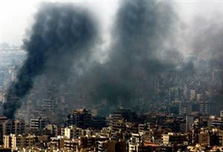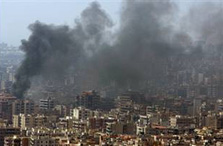|

Tomas Stargardter emailed Enter after reading, in edition five, the Talking Point article about how technology is changing the news business.
To read the article in edition five in full visit Archive by clicking
on the menu on the left.
Says Tomas, who is Photo Editor at La Prensa in Managua, Nicaragua: "The technology has changed but the rules have not.
Actually the ethical rules that govern photojournalism are at this point more
important than ever.
As it becomes easier to manipulate images, it's the trust we have on the photojournalist abiding by these unbending and unchanging rules, that allows us to sell the message.
Altering images through digital means is just as unethical as posing a scene
to be photographed.
As "people or citizen" electronic journalism continues to grow, the need for properly trained and educated photojournalists is higher since they are the ones that will guarantee that work is unbiased and true.
The recent Reuters image from Lebanon (see right) is just another example of a news agency relying on local photojournalists only to gain early access.
The price was tainted images that tarnished the reputation of the agency. As journalists, our credibility is our only asset. Once we lose that we have lost
it all."
|
|



This is the clumsy case of photo manipulation referred to by Tomas. It cost a Lebanese photographer his relationship with the Reuters agency in August 2006. Internet bloggers noticed that the image above had been doctored to show damage following an air raid on Beirut was worse than it really was. Repeated cloud formations, inserted in Photoshop, gave the game away. Reuters apologized, replaced the image with original below and said it would not be using the photographer again.





|
|
